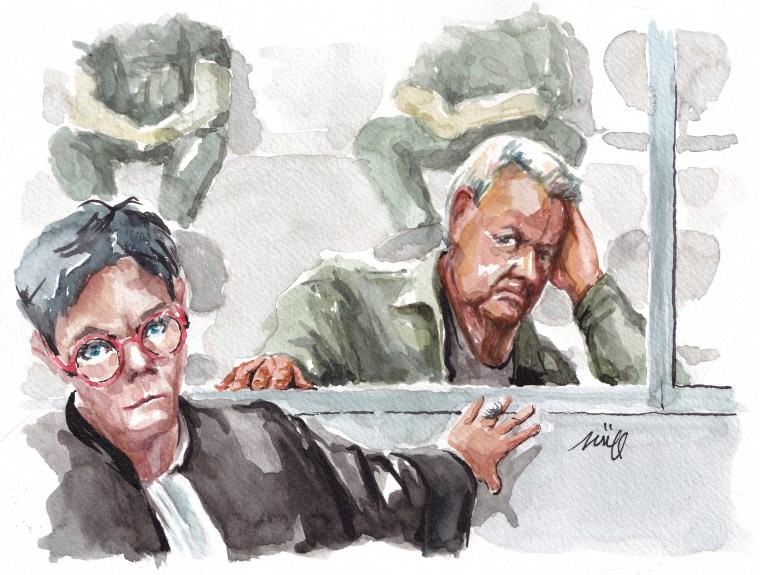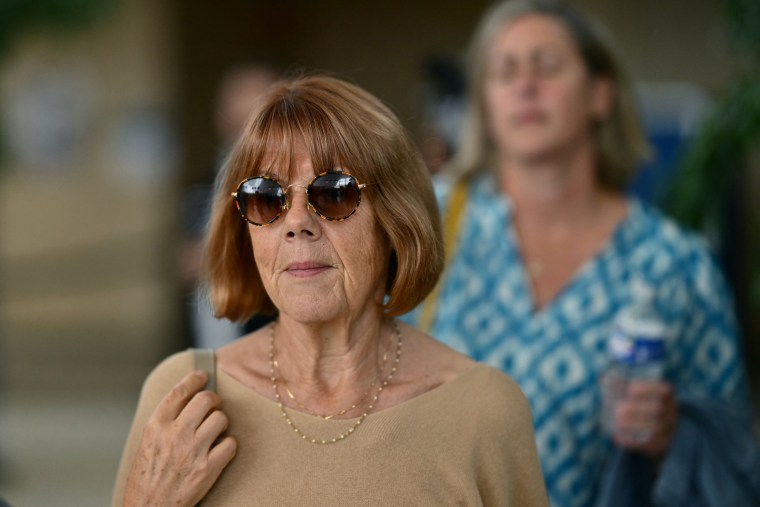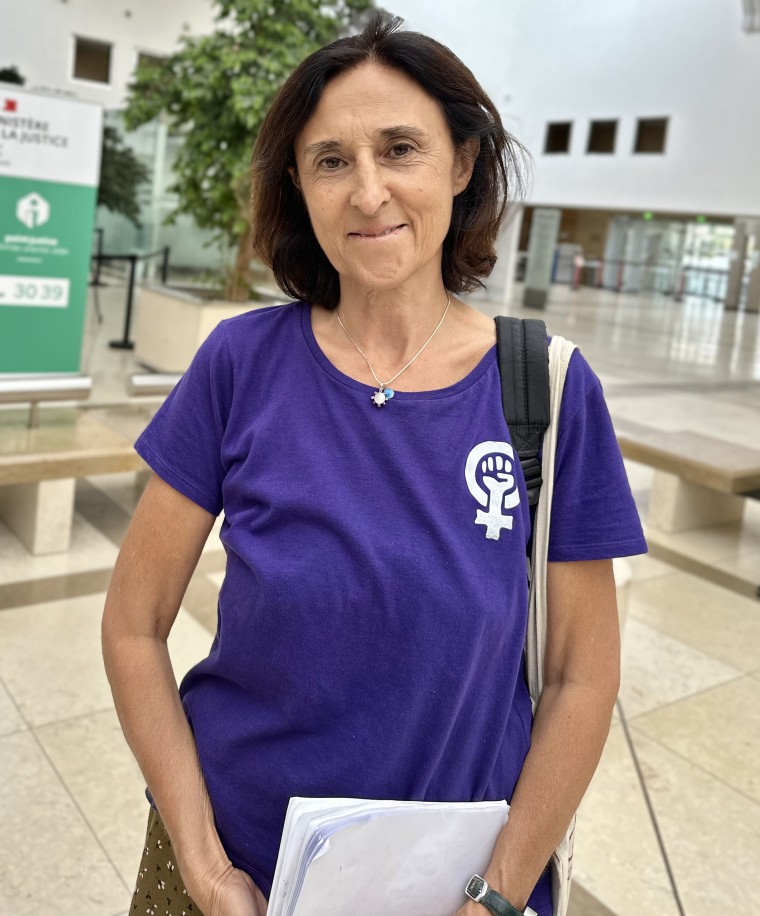Gisèle Pelicot inspires hope for change as mass rape trial shocks France
MAZAN, France — This quaint village nestled among rolling hills in the south of France seems an unlikely setting for a crime so horrific it strained belief: Over a decade, police say dozens of men systematically raped a woman as she lay unconscious in her own bed, drugged by her husband of 50 years.
Dominique Pelicot, 71, a retired electrician, has admitted to orchestrating multiple rapes of Gisèle Pelicot, 72, offering her to a steady stream of men he met in an online chatroom and filming the repeated assaults until his arrest on unrelated charges in September 2020.
Over the next two years, police would identify 50 of 83 men they say were captured in over 20,000 photos and videos recovered from his computer.
“I am a rapist, like the others in this room,” Pelicot told the court Tuesday, as his long-awaited testimony began.

While the mass trial — which began Sept. 2 in the regional capital of Avignon — has riveted France, women’s rights advocates are hoping the case will prompt change in a society that they say is steeped in sexism and casual misogyny, where only 6% of rape complaints are prosecuted.
Some activists went further, describing a “rape culture” that allowed Dominique Pelico to commit and direct unspeakable acts for so long. They wonder how many men knew what was happening in Mazan and didn’t call the police, not even anonymously. And they suspect the problem of drugging and “date rape” is far more widespread than anyone knows.
The trial “has become a symbol of the worst that male violence can do,” Anne-Cécile Mailfert, president of Fondation des Femmes, told NBC News.
In a move rarely seen in France, Pelicot refused to remain anonymous.
Women like Mailfert have lauded her choice to go public with the “barbaric” details directed by the man who she had believed was a loving husband, caring father and doting grandfather. Her act of defiance has recast the trial as the story of her agency rather than her victimhood.
Cameras have tracked her striding into the Palais de Justice each morning, her head held high. Her face has appeared on the front page of newspapers and magazines, a determined gaze behind smoky sunglasses framed by copper bangs.
“Today I’m taking back control of my life,” Gisèle Pelicot testified on the third day of the trial, which is set to continue until mid-December. “Many women don’t have the proof. I have the proof.”
Activists have praised her “dignified, courageous and radical” demeanor, in the face of sexual assaults that otherwise thrive by silencing women with shame and fear. And last weekend, thousands of supporters in Paris, Bordeaux, Marseille and other cities rallied in support of the woman who many are hoping will prompt other victims to come forward — and encourage police to more aggressively pursue cases of sexual assault.
Standing at a podium in front of five judges, Gisèle Pelicot, who suffered years of memory lapses caused by high doses of antidepressants crushed into her food and drink, spoke in a clear, strong voice.
“It is not for myself that I am testifying, but for all the women who suffer chemical submission,” she said, using the term that under French law refers to drugging a victim and is considered an aggravating circumstance, with a maximum of 20 years in prison.

Mere feet away, her now ex-husband slumped in a glass box built to hold 18 defendants not released on bail. Many of the nearly three dozen others who had been released sat among the spectators and journalists, many with eyes fixed on the floor.
Although one man told investigators “it was like raping a corpse,” many told police they believed the wife was pretending to be asleep, a swinger who was a willing participant. Others said it was sufficient that the husband consented. While many are charged with raping Gisèle Pelicot one time, others are charged with as many as six assaults. Le Figaro newspaper reported that 35 men said they did not consider their actions to be rape, and only 14, when confronted with the images, said they regretted what they did.
Most of the men are familiar faces in the towns ringing Mazan. They range in age from 26 to 74 and include truck drivers and tradesmen, a firefighter, nurse, soldier, prison guard and journalist. Half of the men have families. One is a father-to-be. They shuffled into court as if folding into themselves, clad in hoodies, caps and Covid masks.
“They considered me like a rag doll,” she said. “Like a garbage bag.”
Defense lawyers have complained to the court that their names, not usually made public before conviction, have been posted online and their families harassed.
“Everyone knows who they are,” said Blandine Deverlanges, founder of the activist group Amazones d’Avignon, which has led protests outside the courthouse. “They are everywhere. You go to the bakery, there are two of them. You go to the café, there are five of them, and so on.”
Dominique Pelicot meticulously documented the attacks, labeling each by name and date and tucking them into a master folder titled “Abuse.” Police said that trove of images allowed them to uncover a widening circle of abusers — and another victim.
Leaning on a cane as he limped into court Tuesday, Dominique Peliquot settled into a blue armchair and began to give testimony that will be crucial in the cases of the other defendants. He missed much of the proceedings last week due to what his lawyer said was kidney stones and an infection.
They knew everything, they can’t say otherwise,” Dominique Pelicot said, begging his family for forgiveness. “She did not deserve this,” he said of his wife.
“I had an addiction, I had needs,” he said. “And I’m ashamed.”
The sole man on trial who is not charged with assaulting Gisèle Pelicot is Jean-Pierre Maréchal, 63, a retired truck driver from Montségur-sur-Lauzon, an hour’s drive from Mazan, who police say obtained drugs from Dominique Pelicot and copied his methods, spiking his wife’s food with drugs and tweaking the dose until he got it right.
Maréchal is charged with repeatedly raping his wife and offering her up to Dominique Pelicot, who is allegedly recorded in at least three of the 12 assaults involving the woman, now 53, a mother of five.
“I admit the facts,” Maréchal told the court.
As with the other accused men, prosecutors say Dominique Pelicot met Maréchal on a website that has since been shut down, after it was implicated in 23,000 criminal probes. In a chatroom on the site called “without her knowledge,” Dominique Pelicot used the handles “pervert” and “dominator.”

In contrast to Gisèle Pelicot, Maréchal’s wife, 53, a petite woman in glasses, did not press charges against her husband, nor did she divorce him “for my children.” She testified last week, in tears, saying that “everything was wonderful” with her husband, for whom she still “has affection,” She added, “It is inconceivable that he did this.”
In addition, Dominique Pelicot is charged with secretly taking naked pictures of his two daughters-in-law and recording his only daughter, Caroline Darian, unconscious on a bed wearing her mother’s underwear. Darian, 46, who has called her father a “monster” and believes she was drugged, published a book about the case in 2022.
On the stand, Gisèle Pelicot credited the police officers who “saved my life,” when they summoned her to the station in November 2020 and told her that the man she believed to be a “super guy” had been recording her rapes since July 2011.
Two months earlier, Dominique Pelicot had been arrested while his wife was out of town, caught trying to film up three women’s skirts at a local supermarket. Suspicious investigators then searched the Pelicots’ house, finding the decade-deep cache of images.
Such follow-ups do not happen often enough, activists say. Since the #MeToo movement raised awareness about sexual violence, rape complaints in France have nearly doubled, yet only 6% were pursued by investigators in 2021, Mailfert said, adding that there are fewer rape convictions in France today than in 2007.
Indeed, Dominique Pelicot had been arrested before, nabbed in a supermarket outside Paris in 2010, using a pen-camera to film under women’s skirts. He was released with a 100 euro fine, and his wife was never told about the offense.
Had she known, Gisèle Pelicot said she would have been on alert, and that may have led her to question the memory loss she experienced — she feared dementia or Alzheimer’s — along with hair loss, fatigue and a slew of gynecological problems. Although one of the men accused of raping her is HIV positive, she has tested negative.
DNA swabs in that Paris case led a cold case squad to link Dominique Pelicot to an attempted rape in 1999 of a 20-year-old woman, who fought off her attacker. He is also under investigation in connection with the rape and killing of a 23-year-old in 1991. Both victims were real estate agents in and around Paris, showing apartments for sale.
“We have a very strong rape culture in France,” said Valentine Rioufol, 61, vice president of the group Dare To Be Feminist, echoing Mailfert and other activists. “It’s time for the justice system to do its job.”
As they waited to be let into a spillover courtroom where the trial was being broadcast, Rioufol and Salma Sabri, 38, a high school teacher who brought along her 12-year-old daughter, pointed to everyday behavior that they believe “normalizes” misogyny, such as sexist jokes explained away as “French humor.”

“When I travel I see the difference,” Sabri said. “For example in Canada, this kind of joke, it’s not allowed,” said Sabri, who lived in Montreal.
Not everyone agrees.
At a café in the center of Mazan, where the Pelicots retired to a comfortable house with a large garden and pool in 2013, Stephanie Vincent, 45, and her aunt scoffed at the notion of rape culture.
“We are not scared here,” Vincent said, dismissing the case as an atypical “perversity.” She said she didn’t know the Pelicots and didn’t know anyone who did.
Behind the bar, owner Charlotte Flegon, 28, said everyone knows someone connected to the case. She marveled at how such “atrocious” abuse could go on for so long, undetected. Dominique Pelicot obtained hundreds of prescription drugs from his own doctor, who declined to speak to police.
“People don’t want to get involved,” Flegon said. “Somebody should have known.”
One villager who will not be returning is Gisèle Pelicot. She left home with two suitcases packed with “all that was left of 50 years” of the life she built with her childhood sweetheart.
“I no longer have an identity,” said Gisèle, who has reclaimed her maiden name.
“The facade is solid, but inside, it’s a field of rubble,” she told the court. “I don’t know if I’ll ever rebuild myself.”





